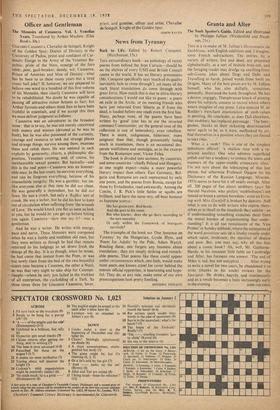Granta and After
THIS.IS a re-make of M. Jullian's Dictionnaire dtc Snobbistne, with English additions and, I imagine, some French subtractions. The entries, by a variety of writers, live and dead, are presented alphabetically, as a sort of bedside bran-tub, and the foraging reader may dredge up anything from sub-Gran/a jokes about Dogs and Debs and Travelling to harsh, poised words from Swift on Origins. Many of the best pieces are by M. Jullian himself, who has . also skilfully, sometimes pointedly, illustrated the book throughout. He has a decent, ungiggly, Theophrastan knack of pinning down his subjects, content to record where others weave intaglios of coy prose. I also enjoyed M. de Rudder's trenchant examination of snob-values. in painting. He concludes, as does Dali elsewhere, that snobbery has replaced patronage : 'The bour- geoisie. thanks to their sickening determination never again to be, as it were, outflanked by art, find themselves in a position where they are forced
to take risks. . . .' •
What is a snob? This is one of the simplest. definitions offered: 'a shallow man with a re- stricted intellect. One who admires superficial polish and has a tendency to imitate the tastes and manners of the upper-middle aristocratic class." I'm not sure about the telescoping of that last phrase, but otherwise Professor Ojegow (in his Dictionary of the Russian Language, Moscow, 1953) seems to have hit it off neatly enough. After all, 200 pages of fun about snobbery (pace Sir Harold Nicolson, who prefers 'snobbishness') are bound to breed a certain. boredom : even an Even- ing with Miss Grenfell is broken by dancers. And what is one to do with writers who expose them- selves as in thrall to the standards they satirise-7as if understanding something exorcises them from the moral burden of implementing that under- standing'? It is all too reminiscent of the 'Vice Probes' in Sunday tabloids, where the reiteration of the word prostitute sets up a smoky reverie under which squat, irrelevant, the statistics of disease and pain. But, you may say. why all this fuss about a comic book? Ah, well, Mr. Gathorne- Hardy, in his innocent little fable on Cambridge and After, has foreseen one answer. 'The end of
Miles is sad, but not untypical. After trying to write a novel for two years, he abandoned it to write (thanks to his uncle) reviews for the Spectator. He drinks, heavily and continuously and as a result becomes a bore increasingly early
.104

























 Previous page
Previous page